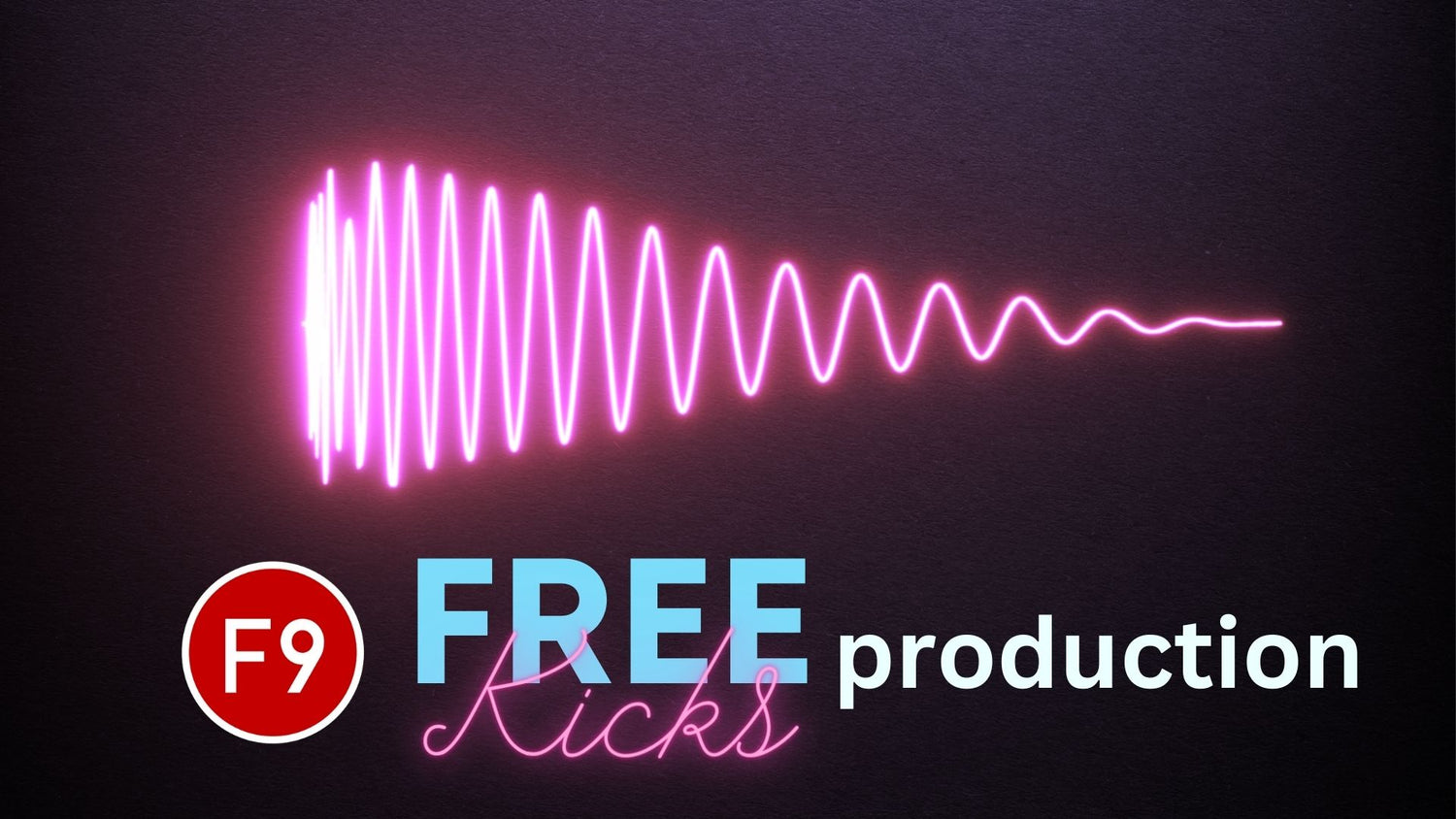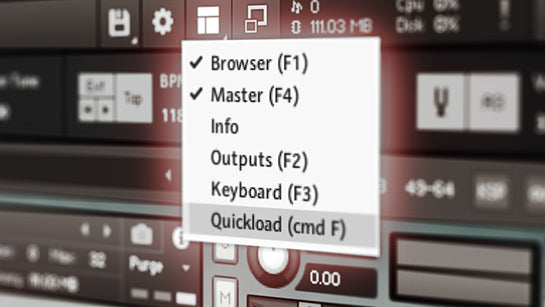
After chatting to a number of producers on Reddit we saw that one of the most common issues facing you guys is getting the bass end right. Bass and sub is all about foundations - If you start from a solid kick drum every decision you make will be better and easier.
We are happy to present to all of our F9 friends a pack of Kick drums that we know work for both club and radio. I have also included a PDF documenting my bass end journey and a whole series of tips to hopefully help you on this vital part of modern production.
CLICK HERE to download the kicks
Here's the PDF text:
I’ve put this small collection of kicks together after conversations with a few of you on Reddit . So you know I’m not just another random producer let me introduce myself: I’m James Wiltshire, 1 half of UK based Remix and Production team The Freemasons. I’ve worked professionally in music since I was 18. I have a Grammy nomination an multiple music awards under my belt.
We were most active around 2007 when a series of high profile club remixes of Beyonce and Kelly Rowland R+B tracks were used as the main club and radio versions around Europe and a couple of them went to number 1 in national charts.
I have struggled with bass end all my career - As the house movement changed around 2009 and Minimal house then EDM exploded I struggled as I was still using old core drum sounds. Everything had changed sonically and I hadn't kept up. I also (stupidly) assumed a lot of the kicks in sample packs were good enough.
Whilst working with ministry of sound 5-6 years ago, instead of getting their normal mix engineer to finish the work we tested out what was then a new type of mastering - Stem mastering. When my tracks came back (from the mixes I had done as normal here) I was blown away - suddenly they had the sound we’d been after for the last few years - The mastering engineer (Kevin Grainger at Wired masters) and I became friends and we discussed what he had changed - Amongst the normal stem work he’d replaced kicks in 2 of the tracks and worked hard on the kicks in the other 2.
That moment literally changed everything for me in production and I’ve since learnt just how incredibly important it is to build your tracks up from the best core sounds - I guess the analogy is building a house - if you start from solid foundations (kick and bass in production terms) everything else will sit properly till you reach the roof.
These kicks have been pulled directly from my stem mastered files of various productions and remixes - I have supplied a selection as its what you need - not every kick will work in every track - depending on your bass and it’s sub content and style some will work sometimes, some will work with others. Do remember I work in house so these might not be the best for 140Bpm bass music or D+B.
Tips to use them:
• Not all samplers are equal - The best way to use these is drop them as audio files onto your page (and turn all warping off, obviously). If you are using sampler VSTs or in built ones remember that only a few sampler engines are built for transient / drum work - Machine, MPC and Battery are the very best - Kontakt is good too, but place it in ‘perfect‘ mode, if you are in logic use Ultrabeat / Drum designer over EXS 24, If in Ableton use impulse over drum racks or simpler/sampler. I don't know as much about over DAWs but basically if you have a device that meant for drums only then use it instead of multipurpose samplers.
• Kick length is vital - The length of the kick is often just as important as the sound - as a quick rule of thumb - if you are using long drone, subby or Reese style basses use a shorter kick, you may also want to shorten the kick length if your bassline is musical with lots of notes. This just gives more room for the basses. If using audio regions, edit one kick down (and fade the very end to avoid clicks) then copy it across for a bar / 4 bars - see if it sits better, if not try again - it doesn't matter if you spend an hour doing this; it will be time well spent and eventually you’ll learn whats best and get quicker at the process.
-
If you have access to AHD envelopes (Machine and MPC have them) you’ll find them perfect for doing this.
-
Monitoring - Look up the tech specs of your monitors - where do they start to roll off? I have a pair of Genelec 8030As and a pair of Event Opals here - The gene’s start to roll of at 40Hz and at 35 Hz are down 6db (that’s half perceived power).
-
On paper my Opals look amazing - they go all the way to 20Hz - Until you see the graph that is:

-
Oh dear - They start to roll off at 45Hz and hardly do anything at 20 Hz (don't believe the figures alway look for the plots). So basically neither of my monitors will reproduce the lowest subs - Also I know I have room nodes at 90Hz, 45 HZ and 22.5Hz causing cancellation (Which might Explain why G and F# are difficult keys for me to work in).
-
You make changes to bass parts on the information your ears get - With this information it’s going to be very hard to know exactly whats going on at the arse end of the sub spectrum.
-
Luckily I have a couple of very good pairs of headphones here - Headphones put you in a completely designed acoustic environment and both mine reproduce frequencies all the way down to 17hz - perfect you might think - well not really - Having drivers sending out digitally derived drum parts a few cm’s from your eardrum means we tire of the transients very quickly.
-
So my method is mixture of the two - using monitors, then headphones for few minutes then rest the repeat - resting your ears is vital.
-
Mixing Stress and bass end - If you get at all stressed trying to get bass end working something really odd happens - the adrenaline thats natural by product of stress causes your hearing to change - it filters out top and bottom as it starts to concentrate on the midrange - this is a survival throwback as in early human history it allowed us to listen out more for human instructions or communication or animal calls / movement . if you feel the stress coming (and trust me - We all get it - it’s even been discussed at length by Deadmau5) stop immediately and do something else for 10 mins - leave the room, when you come back an you’ve calmed down; it will all sound better.
-
Too much Sub. The most common problem I see in modern production is wayyyyyyyy too much sub in bass parts. VSTs throw out what can often be considered theoretical amounts of sub harmonics - the kind that gets filtered out by connection leads and preamps on real world hardware. If you constantly find your track is just a messy subby soup and your speakers complain really early then this is normally whats going on.
-
These kicks should need little EQ treatment as long as you've picked one that sounds good already in your track (no more than a Db or of EQ or compression here and there) so now its time to get your bass working with them.
-
Learn to control the sub end of your bass parts with Hi-pass filters and shelving bass EQ - if you ever apply a shelf filter (or wide Q parametric EQ) to a bass part you should nearly always (99% of the time) apply a Hi pass filter at the same time - Start with a 12Db/oct filter first and either sharpen the slope or soften it depending on the results .
-
So where to set the hi pass filter? Well this just comes with practice and depends on the EQ and the sound. I always just start at 40hz and see what happens.
-
Now before all of you take a sharp intake of breath and scream blue murder at filtering at 40Hz, please remember something - With a Hi pass filter you are NOT cutting everything below 40hz, you are gently filtering it off with a nice curve so that at 20 HZ it’s 12 db down (if using a 12db/ oct Filter) and its probably only about 4db down at 30Hz. Normally at the corner frequency nothing has changed - this will start to get the subs under control so you can then EQ more bass in above the sub range without swamping the sub region (that you may not ever be able to hear due to the monitoring situation we’ve discussed above). You do not want the same level at 20hz as you have at 60 - you want a hell of a lot less and this is the best way to get it.
Some hardware EQ emulations can be very useful in these situations; There is a reason Neve and SSL Eq’s are loved by hardware engineers. Their filter and EQ circuits are beautiful bits of engineering and work together to produce results that work incredibly well for the human hearing. For example; A classic bass move on an SSL Channel might be to have the Hi pass around 50 Hz but piling loads of 110 Hz shelf on with the main channel EQ (about 7db), there is still lots of information below 50 but it’s just way under control - I’ve had the Hi pass up to 70hz before on a tech house sub patch and it sounded incredible.
Phasing and the Keyed Kick debate
- If you have two bass tones at the same frequency but not in phase they will cancel each other out, if that phase is 180 degrees out they will cancel each other out entirely. If one tone is a few hz out you will get intermittent phase cancelation (often known as beating). Neither of these things will give you a good bass response. This is pure Physics.
- This is why its often very dangerous to have your kick perfectly tuned to the key of your track; you’d think it would be pleasing, but if your sub tones are that close on both bass and kick they can cancel if one moves just a tiny amount.
- I have seen a huge amount of utter nonsense regarding Keyed kicks on Forums, in interviews and often from named producers who I actually know for a fact don't ever do it, but feel that they have to look clever in interviews. 9/10 it is total and utter bollocks and can cause you to think you have something nailed when in actual fact due to simple wave theory you are making more problems.
- If you are using 808 styled droning bass/Kick hybrids or those Huge EDM styles kicks where kick and bass are one instruments then its different - if you are producing a modern deep house track then honestly don't waste your time and energy with Keyed kicks - just use your ears.
- Often whats actually best is the kick fundamental a few semitones away from the Bass parts so there’s no negative interaction between them but please i ask you all to drop the theory and conjecture here and actually spend time doing the work instead of over thinking the whole thing
Also - ALWAYS place a utility plug in on your kick flip the phase to check out the difference - sometimes this makes all the difference and the bass suddenly sits - If you use big snares with lots of bass end you may wish to try the same on them.
We don't listen with our eyes, our hands or our memory - we listen with our ears.
So please please PLEASE forget the Hubris and just start experimenting. Find a kick that works with your track and if it’s still causing messy sub action even after you’ve sorted your bass out then try pitching it up or down a bit (max a couple of semitones) or just swap it till you find one that works. The is no magic bullet or secret formula; Some kicks just work, some dont work and others just have a magic that makes them work regularly.
I have tried countless time to investigate why and I have no answers for you - Other than I think its all about the first few Ms and the processing speed of the human brain, but I simply cannot tell you why some kicks are better than others - but trust me, some just are and as Eric Morillo once said (when you find a good one, just rinse it).
There has never been a case where a dance floor stops and the crowd walk out murmuring ‘That's the same kick drum he used last time; I want my money back’. No named Dj has ever dismissed a track on Beatport or not played it because they think a producer might have used the same kick.
Don't get caught up in the trap of making records for other producers; You are making records for you and your hopefully soon to be discovered fans and the public, clubbers and promoters. None of them give a monkey’s arse if you make a new kick drum for every production out of 647 different layers 4 bit crushed shakers and some Foley you nicked off a mate’s thumb drive or not.
Outro:
This zip will hopefully give you some great starting points for all of this. The only way you can get good with all this is practice. So my advice is stop making tracks for a bit and do a couple of days investigation.
These kicks in the right environment will work brilliantly. So now you have a sonic reference point - Two trusted pairs of industry ears know that they can work inside the right track so get one working then try different ideas with bass parts and see how you get on - create a workflow that suits you
Your hearing is as unique as your fingerprints and so is your brains responses to music. I’ve had to work incredibly hard to train myself to concentrate on the bass parts over 20 years as I always want to start messing with the notes instead - my mind naturally heads to the mids and upper mids
I know others that are natural at bass end and can make a change in less than a minute that I’ve missed for a whole week that will bring a track together - I am always jealous as it’s a huge part of modern production
These days I’ve learnt to collaborate more - don't listen to anyone who tells you that as a producer you should be doing every single part of this - That is the biggest crock of shit you will ever hear - Pick out some classics you love across genres and styles and look up the label credits - you'll hardly ever see just one person - it’s always a number of like minded people working together
Arguably one of the best producers of all time - Quincey jones - Did he engineer and mix his records ? - Did he play drums ? , Did he do all the keyboards ? - No - he found the very best people to collab with and then made the very best record he could
Music has always been best when people work together - unfortunately the internet is full of people with absolutely no track record telling you the opposite - Don't listen to them - at all !
I truly hope these helps you guys out, best of luck with all your productions this winter. If I can do it (as I am literally just a normal guy) then so can you!
James Wiltshire - Freemasons / F9 Audio




14 comments
Leave a comment
This site is protected by hCaptcha and the hCaptcha Privacy Policy and Terms of Service apply.